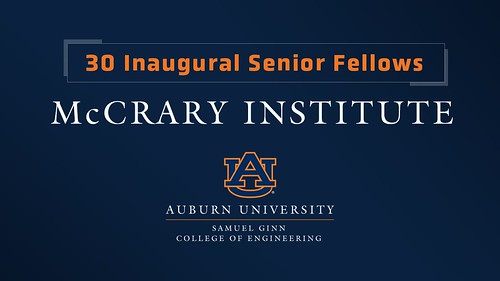Auburn University announces cohort of 30 nationally renowned senior fellows
Article body
Thirty national cyber and critical infrastructure security leaders are joining the McCrary Institute as senior fellows, adding their expertise toward development of practical solutions to national security challenges.
This select group includes senior leaders with a depth of experience in government, private industry, and academe. Their high-level government service includes at the White House, on Capitol Hill, in the Department of Defense, and the law enforcement, intelligence, and homeland security communities.
“This new cohort of senior fellows is tremendously talented and brings a wealth of national security expertise,” said Frank Cilluffo, McCrary Institute director. “Their knowledge will help power our efforts to shape policy and impact practice in the United States and build a community of experts committed to advancing our cyber and critical infrastructure security.”
Senior fellows participate actively in the development and execution of the work plans of the McCrary Institute, engaging through multimedia, pursuing research and publishing regularly on timely topics of pressing interest and concern.
“The insights and experience that this distinguished group of senior fellows brings to the table will help take the work of the institute to a new level,” said Charles D. McCrary, namesake of the institute and Auburn University Trustee. “These fellows will deepen the institute’s capacity to help tackle some of the country’s most pressing challenges.”
The McCrary Institute, based in Auburn but with additional centers in Washington D.C., and Huntsville, seeks practical solutions to pressing challenges in the areas of cyber and critical infrastructure security. Through its three hubs, the institute offers end-to-end capability – policy, technology, research and education – on all things cyber.
The new McCrary Institute Senior Fellows are:
Managing Principal
The Atkin Group
Director of Intelligence
Financial Systemic Analysis & Resilience Center
Senior Advisor, Cybersecurity Policy & Strategy
U.S. Department of Energy
Chief Information Security Officer
U.S. Department of the Navy
Senior Executive (Ret.)
Central Intelligence Agency
Chief of Intelligence Operations
Air University
Chief Executive Officer
Cummiskey Strategic Solutions
Principal
Crosscut Consulting
Professor
Penn State University
Cybersecurity Expert
Director for Cyber Integration
The MITRE Corporation
Head of Strategy and Planning for Global Security
Uber
General Manager, Instrumentation and Controls Support
Southern Company
Associate Deputy Director (Ret.)
Federal Bureau of Investigation
Lt. Gen. Reynold Hoover (Ret.)
Principal
RNHoover Consulting
Managing Director, Public Sector Innovation
Marsh & McLennan Companies
Professor
Georgetown University
Global Director of Security & Compliance
Google Cloud
Executive Director
Cyberspace Solarium Commission
Founder
BlackHorse Solutions
Chief Trust Officer
Unisys
National Intelligence Officer for Cyber
National Intelligence Council
Senior Counsel
ABA Standing Committee on Law and National Security
Chief Security Officer
Pattern Computer
Homeland Security Expert
Senior Vice President
Irrimax Corporation
Head of National Security Policy Engagement
Chief Security Officer
Health Information Sharing & Analysis Center
Practice Chair, Government Enforcement & Investigations
Baker Donelson
Director, Homeland Security Operational Analysis Center (HSOAC) Strategy, Policy, and Operations Program
RAND Corporation
Related Media
Media interested in this story can contact Communications Director Preston Sparks at (334) 844-9999 or preston.sparks@auburn.edu.
Auburn University is a nationally ranked land grant institution recognized for its commitment to world-class scholarship, interdisciplinary research with an elite, top-tier Carnegie R1 classification, life-changing outreach with Carnegie’s Community Engagement designation and an undergraduate education experience second to none. Auburn is home to more than 30,000 students, and its faculty and research partners collaborate to develop and deliver meaningful scholarship, science and technology-based advancements that meet pressing regional, national and global needs. Auburn’s commitment to active student engagement, professional success and public/private partnership drives a growing reputation for outreach and extension that delivers broad economic, health and societal impact.





